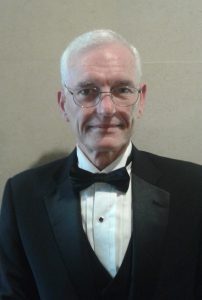What Happened When I Lost My Dad

This is a written stream of consciousness as a processing and coping exercise. I may change verb tenses, include details that aren’t needed, or make very little sense along the way. I just lost my dad, and writing is my greatest mechanism for dealing with it. If you can handle the first-person, present-tense narrative, please read on.
Update 10/22/2017:
I went to an event yesterday and heard Tony Robbins speak. One of the exercises he had us do was to meditate on a moment we are forever grateful for, and I thought of the time my dad visited me and Jami in Texas, and I taught him how to tie a bow tie.
Coincidentally, we just passed the anniversary of his death, and a young man for whom I am a mentor just lost his father to the same deadly, unexpected heart attack. He is processing, and I am helping any way I can. I thought it was a good time to revisit this story and tell it on an episode so you can hear the impact.
Losing someone close to you is an incredible pain. But losing a parent is worse. I can’t even imagine what it must feel like losing a child. This is my story of losing my dad. I hope that it helps you as just rereading it has helped me.
– – – – –
My fiancée and I are changing the settings on our phones on the last Friday evening in September so we can get a full night of pure, uninterrupted, renewing sleep. No alarms, calls, notifications – nothing will happen until 7am. It’s been a long week, and we’d just like to turn in and sleep it off. The lights go out, and quiet slumber is soon found.
1400 miles away, in San Diego, my father is having a “cardiac event” that would take his life.
The morning light comes into our bedroom and wakes us from our dates with dreamland. Jami checks her phone while I’m still checking to see if I even want to wake up yet.
Hey, your mom called me at 2am last night. And so did you sister. You should see if you have a message.
I check my phone and see I have nearly a dozen missed calls from my mother, sister, and two other numbers I don’t recognize. Something must have happened, so it’s time to check the handful of voicemails. Sitting up, I listen to the first message from mom, and realize this is bigger than imagined. The haze of abrupt consciousness makes it hard to truly process the words I’m hearing.
Your Dad is on life support and we’re not sure what’s going to happen now…
After making several calls and gathering data, I need to get on a plane. I’m booking a one-way flight, packing, dressing myself, and trying to make sense of all the details I’ve heard since I woke up.
What happens next? When did he go down? How long was he without oxygen? Is he going to die? What the fuck do you mean by “a cardiac event?”
The drive to the airport isn’t much better. Jami is burying the needle and I’m getting updates from the passenger seat. The sun is hot and cutting against my skin through the car windows. High noon in Texas is exactly like they describe it in old stories. His wife asks us when we’re going to get there, and if my mother and sister are coming. The admission in her voice is palpable. We have to get to him in time to say our last goodbyes before the machines can’t sustain him any longer. I’m coming from Dallas and the other two are coming from Chicago. We’re all hoping for on-time departures.
We should both touch down just after 6, local time. Please keep him alive until we get there. Please.
The flights are easy and nondescript. I meet a nice couple that, after discovering the purpose of my journey, ask to pray with me. It’s not helping. I don’t know what to pray for. I don’t know who to pray for. At this moment, I don’t know how to pray. I just want my dad.
I meet up with my mom and sister, and we’re shuttled off to the hospital by our step-brother. Because they can’t get his blood pressure above 100 over anything, and he can’t regulate his body temperature, they know he’s not leaving the hospital. They’ve consequently moved him up to the CCU to make us all more comfortable.
These words are the kiss of death.
The four of us are quiet on the elevator to the tenth floor. We’re cautiously making our way to his room, wide-eyed at the sheer fact that we’re suddenly in a hospital in California. When we reach his room, I am the last to enter.
He lays propped up slightly, hands elevated under pillows at his sides. His mouth is agape with the breathing tube obtrusively taking center stage. His chest rises and falls, giving the impression that he’s still here. A half-dozen IV lines are blinking and running fluids into his body. The phrase “fixed and dilated” is overheard. This is end-life support. He is almost foreign to me in this moment.
My sister and I are given the room to ourselves so the others can walk away and talk. My sister is much more physical than I am. She is holding his hand, brushing his hair with her fingers, and trying to speak. Her emotions run like waves through her body, making her coherent one moment, and inconsolable the next. I begin to suddenly process the gravity.
Up until about three years ago, my father and I didn’t have a working relationship. My sister and I grew up with more a boss than a father, but made due with what we had. Then, as if he watched a Lifetime movie on Saturday afternoon, he asked me to lunch and confessed that he was a “shitty father.” His words. I couldn’t believe it. I wanted to hear that admission, that apology, that authenticity for 15 years, and suddenly it was sitting between our club sandwiches on a weekday lunch date.
I forgave him. Genuinely. We called it water under the bridge and began a three year affair of sharing ideas, emotions, experiences – I had my dad being a dad, and it felt like everything was right in the world. Now he’s on his death bed, and I still have so much more life to share with him. This is some truly unfair bullshit, and my eyes and my heart cannot contain their displeasure any longer.
I am crying. I am breathing. I am composing myself. I am crying again.
We manage to say all we can muster over the next 15 minutes. The family is again in the room, the five of us wiping away tears and agreeing that we won’t let it go on like this much longer. We all agree that he deserves to go, and we’ve each given him our blessing to ascend to whatever plane awaits him next. Lisa, the nurse on the case asks us to step out for a moment so they can remove the respirator and turn everything off.
Lisa has kind eyes and holds the space for us to be vulnerable and unhurried. She lost her father earlier that year, and her empathy is genuine and radiant. When she motions us back into the room quietly, he is there. Finally. My dad is at peace. No tubes. No lights. No alarms. No movement. He looks like he should. He looks like my dad.
We are crying. We are breathing. We are consoling each other. We are crying again.
When all is said and done, we take a last look at him and walk out. The strangest sensation descends on us: abandonment. We just left him there. Logically, I understand what just happened, but my heart feels like we just left my dad alone in the hospital, forever. Fuck, this hurts.
The next two days are peppered with incredible moments of clarity, appreciation, distraction, and momentarily insurmountable grief. We are now stronger as a divided family than we’ve ever been. The memorial details are completed, and we each go back to our separate homes and lives to mourn and make sense of the feelings that will course through each of us over the next few weeks.
It has been a week since I lost my dad. I still have a hard time writing that. I have an even harder time saying it aloud.
I lost. My. Dad.
I have good days and bad days. Today was a good day. Yesterday was terrible. I cancelled almost everything. The outpouring of support from my friends, colleagues, clients, and even people I do not know has been astounding. I’ve learned just how close my circle in Dallas truly is. You people are beautiful.
I’m processing a little more of my new identity every day. In the event that it helps you reading this, I’ve learned three things I’d like to share from his passing.
- Do what you love, no matter what. My dad was a ballroom dancer, and while no longer competitive, he loved teaching classes in San Diego. That was his true love. He put on his dancing shoes and went to the club the night he died. He spent his last conscious moments on earth dancing, laughing, and quenching his thirst for life. If you could have asked him how he wanted to go, he would have said dancing, and quickly. Well, old man, you got exactly what you wanted. Good on ya.
- Don’t waste a minute hesitating. Tell the people you love how you feel. Take that trip. Risk everything for a chance to elevate the world around you. Forgive radically. Don’t waste a moment wondering –hesitating– whether you should or should not do or say something. One day, you may discover that a minute too late is a minute that lasts forever.
- You are allowed to be and feel anyway you want. I was at the bank the other day and the teller smiled at me, which made me cry. And it’s okay. I felt like going out the next day and laughing about life with friends. And that’s okay too. There’s no manual for mourning. Everyone mourns differently, and each of us is doing the best we know how in that moment. And it’s all okay. You are not doing it wrong if you allow yourself to smile and laugh. However you process, you are still processing and that’s the only objective.
If you or someone you know found something useful written here, please share it. This is my story, and it’s one that I continue to write as each new day comes. I’m sure in a year from now, I’ll have a follow-up that may have more substance. For now, this is just me. Processing.
I miss you, Dad. I love you.

Thomas John Hammerton
2/26/1950 – 9/26/2015




